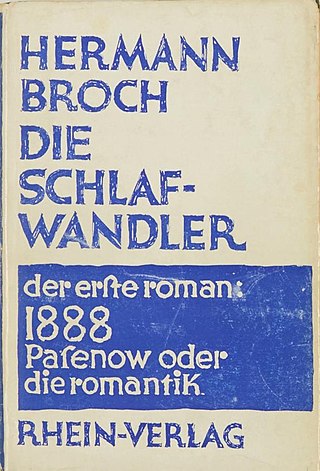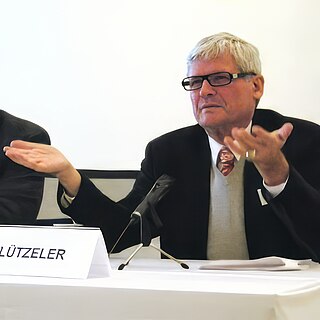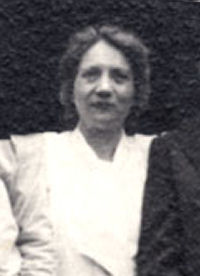
Publius Vergilius Maro, usually called Virgil or Vergil in English, was an ancient Roman poet of the Augustan period. He composed three of the most famous poems in Latin literature: the Eclogues, the Georgics, and the epic Aeneid. A number of minor poems, collected in the Appendix Vergiliana, were attributed to him in ancient times, but modern scholars generally regard these works as spurious, with the possible exception of a few short pieces.

Martin Johannes Walser was a German writer, known especially as a novelist. He began his career as journalist for Süddeutscher Rundfunk, where he wrote and directed audio plays. He was a member of Group 47 from 1953 on.

Elfriede Jelinek is an Austrian playwright and novelist. She is one of the most decorated authors to write in German and was awarded the 2004 Nobel Prize in Literature for her "musical flow of voices and counter-voices in novels and plays that, with extraordinary linguistic zeal, reveal the absurdity of society's clichés and their subjugating power". She is considered to be among the most important living playwrights of the German language.

The Death of Virgil is a 1945 novel by the Austrian author Hermann Broch. The narrative reenacts the last hours of life of the Roman poet Virgil, in the port of Brundisium (Brindisi), whence he had accompanied the emperor Augustus, his decision – frustrated by the emperor – to burn his Aeneid, and his final reconciliation with his destiny. Virgil's heightened perceptions as he dies recall his life and the age in which he lives. The poet is in the interval between life and death, just as his culture hangs between the pagan and Christian eras. As he reflects, Virgil recognises that history is at a cusp and that he may have falsified reality in his attempt to create beauty.

Theodore Ziolkowski was a scholar in the fields of German studies and comparative literature. He coined the term "fifth gospel genre".

The Sleepwalkers is a 1930s novel in three parts, by the Austrian novelist and essayist Hermann Broch. Opening in 1888, the first part is built around a young Prussian army officer; the second in 1903 around a Luxembourger bookkeeper; and the third in 1918 around an Alsatian wine dealer. Each is in a sense a sleepwalker, living between vanishing and emerging ethical systems just as the somnambulist exists in a state between sleeping and waking. Together they present a panorama of German society and its progressive deterioration of values that culminated in defeat and collapse at the end of World War I.
Hermann Burger was a Swiss poet, novelist and essayist. In his creative works Burger often focused on society's lonely outsiders and, increasingly, the inevitability of death. His virtuosity in applying literary styles and use of thorough research are significant features of many of his publications.

The Albert Einstein House at 112 Mercer Street in Princeton, Mercer County, New Jersey, United States, was the home of Albert Einstein from 1935 until his death in 1955. His second wife, Elsa Einstein, died in 1936 while living in this house.

Josef Winkler is an Austrian writer.

Paul Michael Lutzeler is a German-American scholar of German studies and comparative literature. He is the Rosa May Distinguished University Professor Emeritus in the Humanities at Washington University in St. Louis.
Erich Kern, was a far-right Austrian journalist, war-time propagandist, and a post-war Nazi activist. He became a writer of revisionist books that sought to glorify the activities of the German soldiers during the Second World War.

Hermann Robert Richard Eugen Kasack was a German writer. He is best known for his novel Die Stadt hinter dem Strom. Kasack was a pioneer of using the medium broadcast for literature. He published radio plays also under the pen names Hermann Wilhelm and Hermann Merten.
The City beyond the River is a German language existentialist novel by Hermann Kasack, published in Der Tagesspiegel in 1946 and in a longer book version in Berlin in 1947. It is considered one of the most important novels written in Germany after World War II, dealing with the horrors of Nazi Germany, along with works such as Thomas Mann's Doctor Faustus and Günter Grass' The Tin Drum.

Jean Starr Untermeyer was an American poet, translator, and educator. She was the author of six volumes of poetry and a memoir. She was married to the poet Louis Untermeyer from 1906 to 1926.
Venetiana "Veza" Taubner-Calderon Canetti was an Austrian novelist, playwright, and short story writer. Her works – including singular short stories published in the Viennese Arbeiter Zeitung and other socialist outlets – were only published under her own name posthumously. She preferred pseudonyms, as was common at the time for left-wing or satirical authors, her favourite being Veza Magd. The Tortoises which is set at the time of the Kristallnacht in 1938 remains her only known published novel. Her husband and Nobel Prize in Literature laureate Elias Canetti further posthumously declared her to be co-author of his Crowds and Power. She was also a translator of Wolf Solent by John Cowper Powys, though the named translator is Richard Hoffmann who owned the agency where she freelanced, and three books by Upton Sinclair for the Malik Verlag (1930-32), where the named translator is once again male, this time her partner and future husband, Elias Canetti.
Le Temps restitué is a work for mezzo-soprano solo, choir, and orchestra by the French composer Jean Barraqué. It was both the first part to have been begun and the last one to be completed in his projected but unfinished cycle of works based on Hermann Broch's novel, The Death of Virgil. A performance lasts about forty minutes.
Chant après chant is a composition for soprano singer, piano, and six percussionists, by the French composer Jean Barraqué, written in 1966. It is the third part of a projected but unfinished cycle of works based on Hermann Broch's novel The Death of Virgil, and uses texts written by the composer as well as extracts from the second book of Broch's novel, in the French translation by Albert Kohn. A performance lasts about twenty-five minutes.
... Au delà du hasard is a composition for three women's voices (SSA) and four instrumental groups, by the French composer Jean Barraqué, written in 1958–59. It is the second part of a projected but unfinished cycle of works based on Hermann Broch's 1945 novel The Death of Virgil, and uses texts written by the composer based on a quotation from Broch's novel, in the French translation by Albert Kohn. A performance lasts about forty minutes.

Robert Schindel is an Austrian lyricist, director and author.












